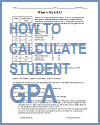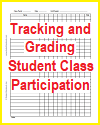Grading and Assessment Guide |
| www.studenthandouts.com > Miscellaneous > Grading |
|---|
 |
|
Grading and assessment are essential components of education for several important reasons.
Feedback and Improvement: Grading and assessment provide students with feedback on their learning progress. They help students understand their strengths and weaknesses, enabling them to focus on areas that need improvement. This feedback loop is crucial for fostering academic growth. Accountability: Grading holds students accountable for their learning. It encourages them to complete assignments, study, and participate actively in the learning process. Without grading, some students may lack the motivation to engage fully in their education. Quality Control: Assessment allows educators to evaluate the effectiveness of their teaching methods and curriculum. It helps identify areas where adjustments are needed to improve the learning experience. This quality control process benefits both students and teachers. Objective Measurement: Grading and assessment provide an objective way to measure student achievement and mastery of learning objectives. This objectivity ensures that all students are evaluated fairly and consistently. Communication: Grades serve as a means of communication between educators, students, and parents. They convey information about a student's performance and progress in a clear and standardized format, making it easier for all stakeholders to understand how well a student is doing in a course. Goal Setting: Assessment results help students set realistic academic goals. By knowing their current level of achievement, students can establish achievable targets for improvement and track their progress toward those goals. Curriculum Design: Grading and assessment data can inform curriculum design and development. Educators can use assessment results to identify which concepts or skills need more attention in the curriculum and adjust instructional materials accordingly. College and Career Readiness: Grades and assessment results are often used for college admissions and scholarship applications. They provide colleges and employers with a standardized way to evaluate applicants' academic abilities and potential. Individualized Instruction: Assessment results can help educators tailor instruction to meet the specific needs of each student. For example, if assessments reveal that some students are struggling with a particular concept, teachers can provide additional support or alternative teaching methods. Motivation and Recognition: Positive feedback in the form of good grades can motivate students to continue working hard and striving for excellence. Additionally, academic achievements can be a source of pride and recognition for students. Lifelong Learning Skills: Grading and assessment teach students valuable skills such as time management, study skills, and the ability to set and achieve goals. These skills are essential for success not only in education but also in future careers and lifelong learning endeavors. Data for Decision-Making: Schools and educational institutions use assessment data to make informed decisions about curriculum, resource allocation, and educational policy. This data-driven approach can lead to improvements in the overall educational system. Grading and assessment are integral to education because they facilitate learning, promote accountability, ensure fairness, and provide valuable information for continuous improvement in teaching and learning practices. They serve as a foundational component of the education system, helping students, educators, and institutions work toward the common goal of academic excellence and personal growth. |
 |
 |
 |
||||||||
| Instructions on How to Calculate Student GPA | Tracking and Grading Student Class Participation | How to Calculate Grades |
| www.studenthandouts.com > Miscellaneous > Grading |
|---|










